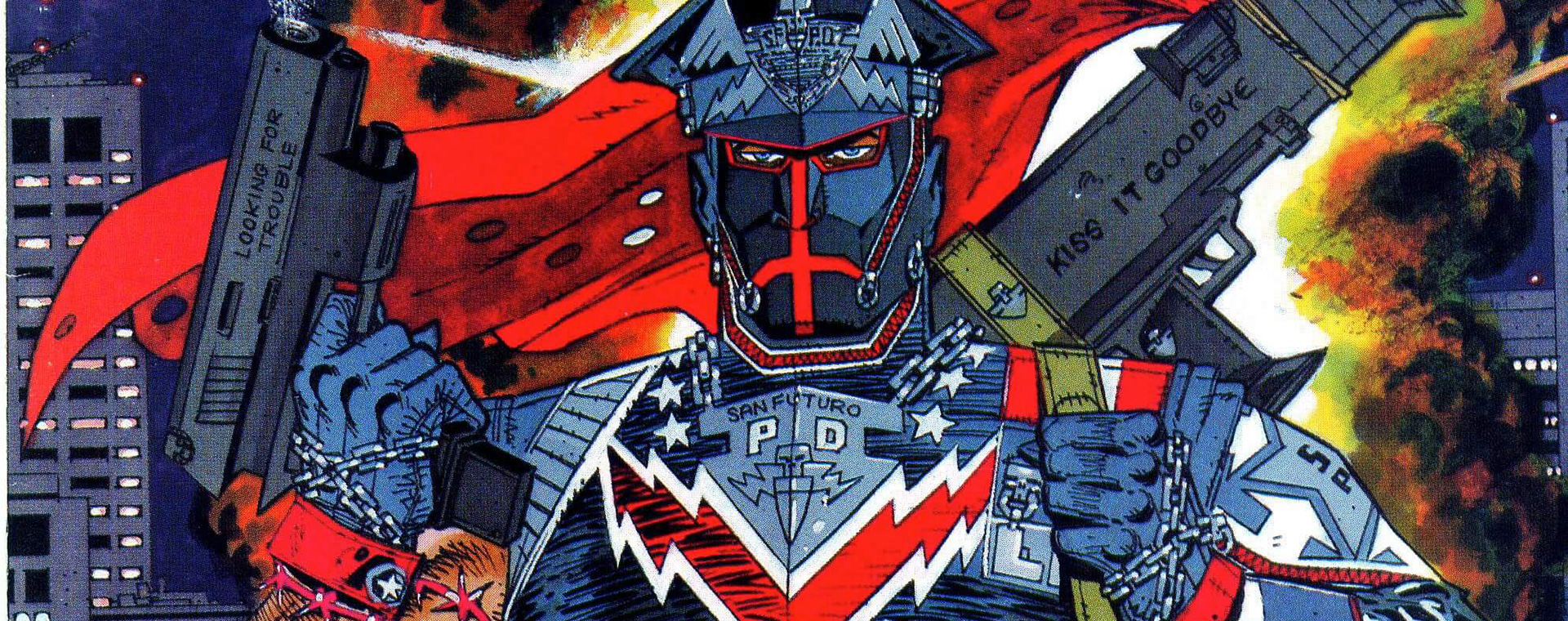
This interview was conducted at Paris Comic-Con on October 2017. Yeah, I know! That was a while ago, but better late than never!
How did I get this interview? Well, through a friend of a friend. Like a bad B-movie, which we all love, it was through connections that I got it. So, I would like to thanks Laurent from Delirium for introducing me to the great Pat Mills (even though he might have lost hope of seeing this particular piece of writing published).
Anyway, if you do not know who Mister Mills is, well you only have one option: got get his damn books, they are just great! Among his most famous work are Charley’s War, Marshal Law, and he worked on the infamous Judge Dredd with Matt Wagner and Carlos Ezquerra.
First Thing First
How did you get into comics? Why the 9th art?
I got into it by mistake, by accident. I always wanted to write and I’ve always been interested in cartoons. I started working for a publisher in Scotland and they produced a number of comics. I learned how to produce comics with them. It was by accident really, rather than by choice. And you must remember in Britain, when I started, that comics had very little prestige compare to France. In France there is a lot of prestige around bande-dessinée. There is not the same acclaim in Britain, even today.
Do you have any inspirational work, favorite author or book?
I think I was always inspired by cartoon. British cartoonists always had a very dark quality about their work. For example Ronald Searle. His work is probably important in France because he has a very cartoony way to draw that appeals to lovers of bande-dessinée. It is very atmospheric and some of his work has been turned into Anglo-American movie like St Trinian, which is about a very sinister school for girls, and the girls are crazy. I think he did an illustrative book about french wine, and so therefore, I think there will be some of your audience who’ll go: “Ah Ronald Searle!” And then, in term of books I would say any of the satirist, any great satirist wether it’s Jonathan Swift… I which when I was a child I had the time and perhaps the intellect to read Rabellais, because Rabellais is one of the great Satirist. This kind of Satire still inspires my work to this day.
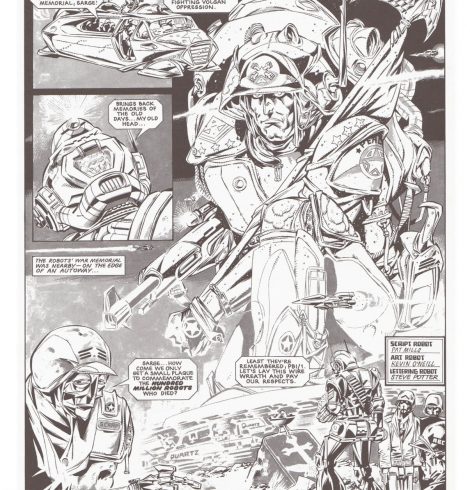
About Comics in UK
The next thing is actually more for my personal curiosity rather than the interview, but I’d really like to know about the 1980’s in Britain. How was it for comic books, underground comic books… It was the Tatcher Years… Was it difficult to get published?
What was interesting was 2000AD and various other comics all came out of mainstream publishing. They came out of the newsstands. Now, even in France, you have newsstands comics but there are not as big as bande-dessinée. You have to imagine in Britain we had huge mainstream sells, the equivalent of … to think of a french newsstand book, you know the book Witches? It’s a newsstand book right? So, that was our market and the publishers let us do whatever we wanted as long as the book sold. So we created a punk culture, an anti Tatcher culture in the newsstand, in mainstream because you are reaching ordinary people, you are not reaching punk, it’s very subversive. There is no point in subverting a punk, he is already subverted. You want to subvert ordinary people out there. This is my interest, I don’t want to appeal in particularly to intellectuals or literary snobs. I want to appeal to ordinary people. It’s very enjoyable for me to do that.
You have a pretty thick body of work, how I did you manage to write that many books?
Another important factor, relevant to the difference between France and Britain. In France if you produce a book, you own the right and you can make a lot of money, in Britain the system was slavery. I’m serious! You sell everything! Because the system is slavery, the only way you can make money is to produce many many books.
So the reason I have so many is because of the slave system. If I’d have been in France I would have retired by now.
Is it still the case nowadays?
It’s better, but it’s still… It’s a more benign form of slavery, it still has a long way to go. It’s better but it’s not right. An argument I made my entire life is that Britain should imitate France and of course Britain, that should come as no surprise to you, imitate America. Bush and Blair…. It’s a mistake, and it’s a mistake we see with Brexit as well.
Sci-Fi and Politics
Let’s talk about your themes. It is mostly science-fiction with political issues. Is it really important for you to have these issues? What drives you to write this kind of stories?
Well, let me see. I’ve wrote a book about the story of 2000 AD and it gives some idea of the motivation. In summary, I would say in comics you can say a lot of things you can’t say in other forms. You can be very direct, you can reach a big audience and your audience is interested in good and evil, in justice and injustice and so to write those stories you look for injustice or justice that you have seen and experienced personally and you think it’s a good subject for a story. One of the weaknesses of comics, of British comics anyway, is the bad guys are pathetic. In really life we all know that the bad guys are really bad. So what interest me is not so much being political as to say let’s not write about silly bad guys, let’s not write about what we would call in Britain pantomime villains, in other words silly villains. Like Doctor Doom. Does he really represent anything that matter? You look for real evil. And there is plenty of real evil out there. But in America the tradition is to always say the bad guy is usually a single crazy guy. A rich crazy guy or even worse he is a terrorist, he is some kind of low life. It’s too simple and there are other bad guys. And I think if you can reach young people at an early age, when they are 12, 13 they are still open to new ideas. Try to reach someone who is 40, he has already made up his mind. Maybe I can reach you, but if you were 40 it’s like, forget it, he has already made up his mind.
About your characters. They are very paradoxical. For example Marshall Law, ABC Warriors, even Judge Dredd. They are soldiers or cop but at the same time they are rebelling against authority. Why these characters?
First, I wouldn’t know how to write a character who didn’t rebel because it’s the way I am personally. In other words: I don’t conform. Also, the audience likes the idea of a soldier who sees things that are wrong. One good example of that is Charley’s War. He is a soldier, he believes he is fighting for good and then, as time passes, he realizes he is probably fighting for evil. To say this in Britain… It’s a paradox! You were saying about the 80’s, it was easier to say that in 1980, that Charley, the hero, was fighting for an evil empire. In my opinion the British empire is an evil empire. Today if you were to try publish Charley’s War in Britain it would be very difficult, we’ve enter a more conservative era today. In the 80’s because of Tatcher, because of the social legacy of the 1960’s, but now everything is… it’s not a good time.
World Building
You created a complex universe for your books with a lot of characters. How did you bid them together? Where did you start from, the characters or the universe?
Probably with the characters, you start with them. What does the character represent? Then, very soon afterwards, you start to build a world and world building is so much fun, but it’s very hard work. It takes a long time, it’s very interesting to do. I like to have a sense of world. Britain is interesting here because in America they don’t care about the background. You look at the cities, New York is one of the most incredible city in the world, but you don’t see it that much in a superhero comic. If you look at a bande-dessinée you see wonderful cities. And in my opinion, sometimes the city is too much, the city is more interesting than the people. In the case of Britain we try to have a mix of the two.
Sometimes I rather look at the city in the background than the characters…
It’s a particular french thing. Sometime in Britain the editor doesn’t care and I say : “No, we have to have this complex world”. The editor or even the artist don’t care because they are used to thinking the American way. There is a challenge here, for example when I did a series for France called Broz with edition Nickel, we wanted the artist to have more backgrounds because the publisher felt there weren’t enough. There need to be more emphasis.
How did you create your characters? Did you have an image…
I have an image in my head. I mean each one is different but often, in a pre-internet era you can’t look at a website or google it, so you have to go back to the traditional way which means you have a lot of photocopies, lot of books and I would have a massive amount of references. I’d say to the artist I want this robot to look like this suit of armor but with this texture, maybe this gun….
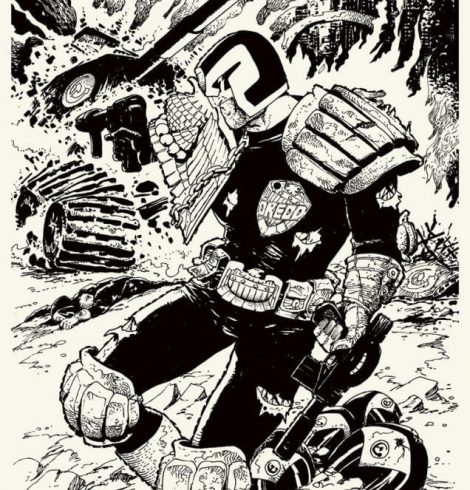
So I have a visual in my mind, so of course I would describe it. That’s how for example Judge Dredd was partially created, except Carlos Ezquerra was better than the writer’s vision. John Wagner the creator and myself said we wanted to look like David Carradine in Death Race 2000. So we wanted it to look a bit like that but when Carlos came back with his drawing we were like: “ok that’s much better!”
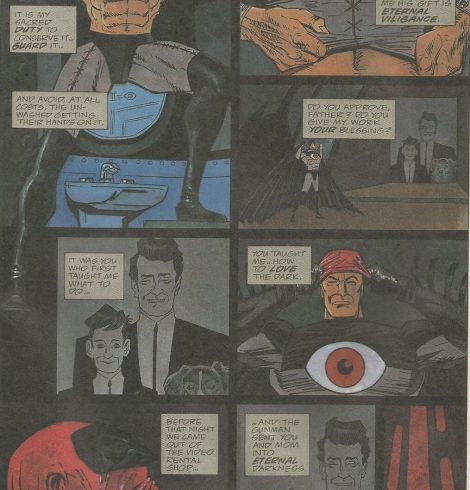
Destroy
Let’s talk about Marshall Law now. Why destroy superheroes? What do they represent for you?
Well this will come as no surprise to you, American superheroes, mainstream superheroes are establishment figures, they stand for the American way and enforcing it on other people. They are rich, upperclass, they are sometimes arm dealer, Bruce Wayne foundation… They present themselves as somehow benign dictators. Bruce Wayne is someone who supposedly care about the world and the people of Gotham. In my experience, if you look at rich people in real life they do not correspond to this, they would often give money to charity and things like that, but that is simply to make themselves look good. And the proportion of money that they give to charity is… The charity itself is often questionable. Charities are racket, are money making racket, not all, but many of them. You give money to charity and most, maybe not most, but a lot of it goes into administration… We have many example in Britain of famous entrepreneurs and so on… So why Bruce Wayne should be different? In Marshall Law I have a similar character called the public eye and he looks down on the city and say: “I have pissed on the city and told them it is raining”. That was true when I wrote it and it’s still true today. It’s like wake up America! Why are you revering these characters? Why can we not have working class heroes, blue collar heroes? Marshall Law is either unemployed or he’s a hospital orderly.
Which creation do you cherish the most?
I think it has to be Charley’s War. There is a reason. Which is that Charley’s War changed people’s life more than any other character in a very tangible way, namely, I’d like to think there were kids who were going to join the army, but they read Charley’s War and they didn’t join the army. And I like to think some of them are alive now because they read Charley’s War. Charley’s War is very important to me.
Aurélien Banabéra
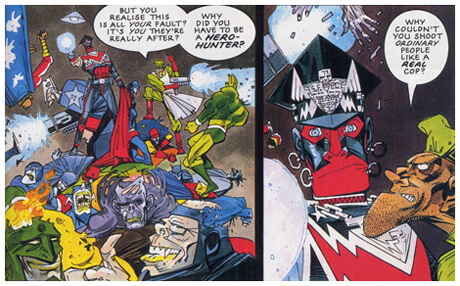
EN RELATION AVEC VOTRE ARTICLE






